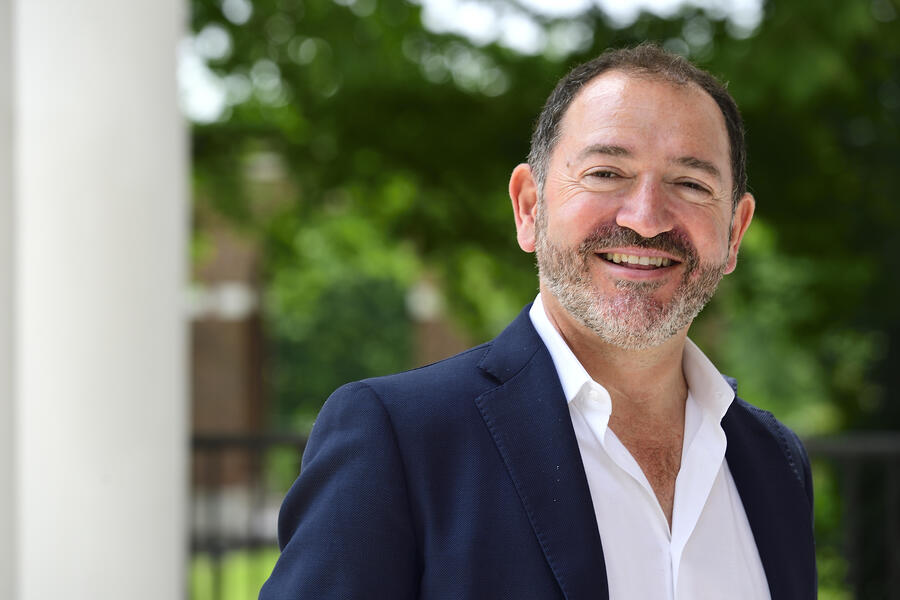Domenico Giannone, an internationally recognized thought leader in econometrics and macroeconomic forecasting, is searching for innovative methods to better understand the complexities of global economic systems, advancing the frontier of how economists interpret, model, and predict these systems. Giannone, who was recently appointed as Bloomberg Distinguished Professor of Economics and Statistics, develops models grounded in rigorous statistical and economic theory to meet the challenges of monitoring macroeconomic risks in real time, ensuring that policymakers are equipped with the most accurate and timely information to navigate an increasingly uncertain world.
"The challenge is to analyze vast amounts of economic data and extract meaningful signals about where the economy is and where it's headed," Giannone says. "In econometrics, more data offers more insight but also introduces more noise. The key is to summarize the data just enough to reveal useful patterns without losing critical details. We need complex models to extract real-time signals from a sea of data. The focus of my work has been on improving forecasting models to handle high-dimensional data while ensuring timeliness, interpretability and robustness."
About the BDP
- Name: Domenico Giannone
- Title: Bloomberg Distinguished Professor of Economics and Statistics
- Appointments: Department of Economics, Krieger School of Arts and Sciences; Department of Applied Math and Statistics, Whiting School of Engineering
- Previous role: International Monetary Fund
- Education: BA in Statistics and Economics, Università Degli Studi "La Sapienza"; MA in Economics and Statistics, Université Libre de Bruxelles – ECARES; PhD in Economics and Statistics, Université Libre de Bruxelles – ECARES
One of Giannone's most influential contributions has been the development of nowcasting, a real-time economic forecasting method. Nowcasting estimates current economic conditions using streams of timely data, long before traditional indicators such as gross domestic product (GDP) are available. Now used by policymakers, economists, and almost every central bank worldwide, nowcasting has revolutionized processing of real-time data and advanced economic decision-making.
Giannone has also developed the growth-at-risk framework as a means of estimating the full range and distribution of possible future outcomes. Instead of predicting the average economic growth, this framework focuses on predicting vulnerabilities, including the chance of very low or negative growth, as a way to gain understanding of how the economy might perform in the future and assess the risk profile of different policy choices.
"In times of uncertainty, predictions about most likely outcomes are not very informative, as there are several likely outcomes," Giannone explains. "Predicting the probability of different outcomes is more enlightening. It's important to think about risk to understand the economy and make sound policies."
Currently, Giannone's focus is on improving how economic activity and risks are monitored in low-income countries, which account for a small share of global income but a large share of the global population. He explains that in low-income countries, data scarcity, delays, and frequent disruptions make it difficult to analyze the economy in a timely manner.
"It's very difficult to make stabilization policies if we don't know where the economy is, like driving a car using only a rear-view mirror," Giannone says. "I believe we can greatly contribute to improving the welfare of low-income countries by making timely predictions of the current state of the economy, ultimately allowing for the design of more effective economic policies, fostering economic stability and development."
Giannone aims to supplement the scarcity of official data by exploiting new alternative data sources, such as satellite images on light pollution, port activities, credit card transactions, and mobile money. Most notably, however, Giannone is excited about the potential of using language as data. While this type of soft information is difficult to quantify and analyze, recent advancements in artificial intelligence have increased the ability to process this data.
"When we write, we are very careful, so text holds a lot of information," Giannone says. "Breakthroughs in large language models allow us to use this incredible source of data, such as economic newspapers or commentaries, social media, reports by journalists, what governmental officials say when they discuss the economy, or what people are searching on the internet."
Giannone brings decades of experience in policy, academia, and the tech sector to Johns Hopkins from the International Monetary Fund and is particularly enthusiastic about the potential for collaboration with colleagues in other fields.
"In the world we live in today, interdisciplinarity is extremely important, and the only way to really push a frontier," says Giannone. "At Johns Hopkins, interdisciplinarity is not only tolerated, but very actively promoted. Instead of being a limit, it's something that I can explore, and I think it's a unique place to do this."
Giannone also looks forward to working with students at Johns Hopkins. Shaped by his experience across multiple sectors, his teaching emphasizes real-world applications. Giannone hopes to pass on his passion for research and innovation to the next generation.
"Teaching has been a central part of my academic and professional career," Giannone says. "I view econometrics as a practical tool for understanding and solving complex economic problems. I want to equip students with the tools they need to understand, apply, and innovate within macroeconomics across academic, policy, and corporate settings."
"Domenico Giannone is redefining the way institutions understand and anticipate macroeconomic dynamics, building innovative tools that inform real-time decision-making," says Christopher Celenza, dean of the Krieger School of Arts and Sciences. "He brings a rare combination of strong statistical training with a deep understanding of economics, and we are honored to welcome him to Johns Hopkins."
"Dr. Giannone's groundbreaking approaches to real-time forecasting and high-dimensional data analysis are transforming our understanding of global economic challenges and his work will catalyze powerful collaborations across engineering, economics, and policy," adds Ed Schlesinger, dean of the Whiting School of Engineering.
As a Bloomberg Distinguished Professor, Giannone joins an interdisciplinary cohort of scholars working to address major world problems and teach the next generation. The program is backed by support from Bloomberg Philanthropies.
Posted in Politics+Society
Tagged economics, bloomberg distinguished professorships, artificial intelligence








